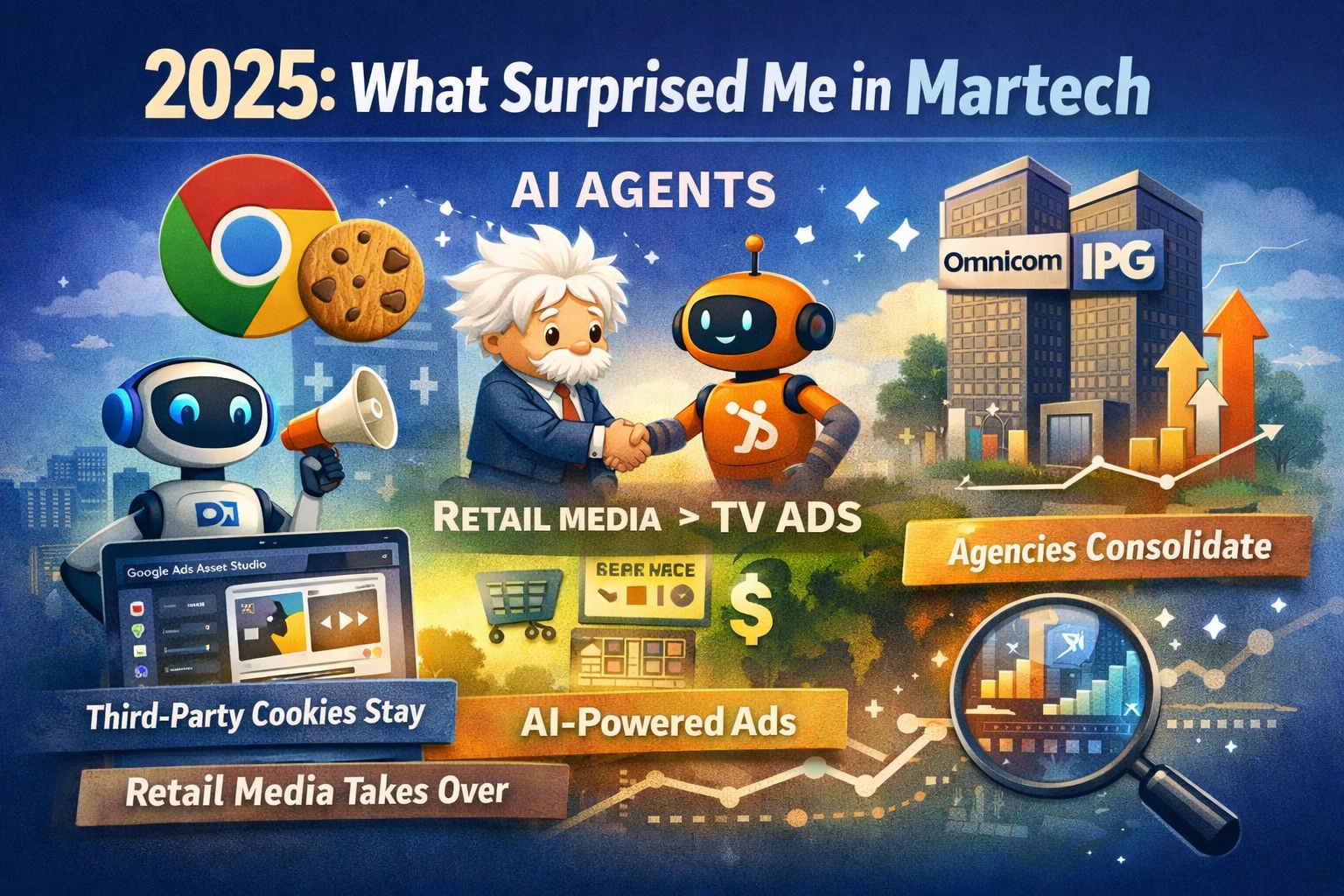The world of digital marketing has been growing and growing ever since it began. Since then, if there’s one thing you can always count on is that it constantly changes, and 2024 is not an exception. The undergoing significant changes in privacy regulations –with developments in Google’s Consent Mode, iOS 17 Link Tracking Protection, or the ongoing deprecation of third party cookies – are just examples reflecting the stricter regulatory landscape we are approaching. On top of all this (as if it wasn’t enough), many marketers are still coming to terms with the transition from Universal Analytics to Google Analytics 4 and the advances made in machine learning and AI in 2023.
That is why, in this article, we’ll delve into some of the biggest challenges for digital marketing to provide insights into how marketers can navigate their way through this ever-changing landscape.
“Data is (still) the new oil. With unparalleled capabilities to drive innovation, economic growth and improve decision-making. However, to ensure responsible and sustainable data practices, we must understand both the benefits and risks associated with mining it, such as concerns about privacy, security, and ethical use.” (Kevin O’Farrell, Analytic Partners).
Data Privacy Concerns
As we shift our focus to 2024, one trend that is set to take the spotlight within this landscape is the growing importance of data privacy. With consumers becoming increasingly conscious of how their personal information is handled, and governments worldwide tightening regulations, businesses and organizations are recognizing the need to prioritize and enhance their data privacy measures. This also underscores the urgency for marketers to adapt their marketing strategies to align with these changes.
Google’s Consent Mode V2
Introduced at the end of 2023, the most recent version of Google’s Consent Mode has taken over the already bustling digital landscape, especially after Google’s plan to make it mandatory in March 2024 for all websites collecting data with Google’s advertising services and Google Ads Remarketing.
While this is not necessarily a bad thing, as you’re already supposed to collect data only from users who have granted you consent, there are still numerous uncertainties about what Google Consent Mode V2 is and, most importantly, the implications that this compliance will entail in the world of digital marketing.
In this sense, without implementing Consent Mode V2, no data about new EEA users will be captured by advertising platforms like Google Ads and GA4 after March 2024, significantly impacting advertising strategies and their effectiveness.
For a deeper understanding, the following Simo Ahava's blog post addresses some of the most critical questions.
iOS 17 Link Tracking Protection
With the release of iOS 17, Apple has rolled out significant privacy and data tracking changes. One of the key features that comes with this update is iOS 17 Link Tracking Protection, which is set to remove certain tracking parameters from traditional URLs in their Mail app, Messages, and Safari’s Private Browsing mode.
Yet, the fact that 20% of users prefer Safari as a browser and that most recent stats show that mobiles are used nearly 60% of the time for online searches, makes it a big hit on how marketers collect and use data for campaign tracking.

With this change, some platforms will no longer be able to track users’ activity on certain parts of their buying journey, leaving marketers with less detailed data about the behavior of their users compared to previous iOS versions.
However, it’s important to mention that not all tracking parameters will be removed, (or at least not at the moment). For the time being, these are some of the tracking parameters that will remain untouched. Fortunately, UTM naming conventions are included in this list.
- Google Analytics (UTMs) - Urchin Tracking Modules
- Klaviyo (_kx): Used for tracking Klaviyo for email marketing campaigns.
- TikTok (ttclid): Used for tracking TikTok advertising campaigns.
- Tracking parameters used in regular standard Safari or non-Safari browsers
Deprecation of third-party cookies
With the phase-out of third-party cookies, the digital marketing landscape is set to undergo a seismic shift that emphasizes the need for businesses to embrace first party data as a key asset in their future marketing strategies.
While this shift emphasizes the need for robust data integration and effective use of interaction data from various customer touchpoints (cultivating direct relationships with your audience, implementing strategies like permission-based data collection, or leveraging contextual advertising to create personalized experiences), it also serves as a call to action for businesses to rethink their Customer Experience and Engagement strategies towards a more customer-centric approach that values privacy and, ultimately, builds trust.
By embracing this change this 2024, businesses that prioritize data privacy concerns will not only comply with legal requirements, avoiding putting your company at risk by breaching compliance standards, but will also build stronger relationships with customers in an era where privacy is key.
Indeed, recent reports state that “consumers are more likely to engage with brands they trust, and transparency in data handling is a cornerstone of that. That is why being open about data storage and usage, among other transparency measures, is emphasized as a way to foster customer loyalty”.

Stricter Regulatory Landscape
Governments around the world are enacting more diligent data protection laws. The evolving regulatory landscape, marked by stringent data protection regulations such as The General Data Protection Regulation (GDPR) in Europe, and the California Consumer Privacy Act (CCPA) in the United States, underscores the urgency for companies to establish robust frameworks that safeguard user data.
In 2024, we can expect a surge in investments and innovations aimed at fortifying data privacy practices that align with this global trend toward stronger data protection.
With it, new technologies like blockchain and advanced encryption methods have emerged to provide robust solutions for safeguarding consumer data and will play a crucial role in ensuring that data remains secure this 2024.
Moreover, as we’ve discussed before, transparency and communication will play a key role in building and maintaining trust with consumers, who are also becoming more discerning in their choices, favoring companies that demonstrate a commitment to protecting their privacy. That is why businesses that are forthcoming about their data collection practices, usage policies, and security measures will likely gain a competitive edge.
Staying abreast of technological developments
Apart from data privacy concerns, 2024 also comes loaded with many of the opportunities presented by the advances made in machine learning and AI. The rapid progression in these fields opens doors for enhanced automation, personalized user experiences, and breakthrough innovations across the Digital Marketing landscape.
As businesses increasingly leverage the power of artificial intelligence, we anticipate a transformative landscape that not only addresses challenges but also paves the way for unprecedented growth and efficiency. In this dynamic environment, staying abreast of technological developments and strategically integrating AI into marketing operations will be necessary for organizations that aim to thrive in 2024. Let’s see this in more detail.
AI on Data Analysis and Digital Marketing
While the pace of AI innovation in 2023 was astounding, the intersection of cloud Data Layers with generative AI will give rise to 'generative marketing' this 2024 as well. This involves using AI for tasks like segment definition, journey generation, and creative suggestion to streamline marketing processes and foster innovation.
AI algorithms can analyze complex data, identify audience segments, and optimize ad campaigns – and do so much quicker and better than we can manually. That is why AI-powered automation should be leveraged by companies that want to enhance their Customer Experience strategies, drive conversions, and build stronger relationships with their audiences.
However, despite the multiple advancements made in AI, human oversight will remain essential for ensuring the relevance and effectiveness of marketing strategies.
Google Analytics 4
Google Analytics has long been a cornerstone in the digital marketing world, offering comprehensive insights into website performance and user behavior. With the advent of Google Analytics 4 (GA4) in 2024, this tool has undergone a significant evolution. GA4 trends and innovations represent a new era of data analysis, integrating advanced technologies to provide deeper, more actionable insights.
The shift to GA4 marks a pivotal moment for businesses and marketers that will still mark 2024. Where traditional Google Analytics provides detailed data, GA4 takes this a step further by offering a more integrated and intuitive approach to data analysis. Embracing a new wave of machine learning and artificial intelligence, GA4 allows for an in-depth exploration of user interactions across multiple platforms, making GA4 an indispensable tool for modern digital marketing analytics.
This leap in technology translates to more than just data processing efficiency; it equips GA4 with predictive analytics capabilities, enabling businesses to anticipate market trends and customer behaviors with unprecedented precision. Machine learning algorithms sift through vast amounts of data, uncovering patterns and insights that would be impossible to discern manually. This feature of GA4 is set to transform how businesses approach data-driven decision-making, offering a clearer roadmap to achieving their strategic goals.
Moreover, the AI-driven insights offered by GA4 help in identifying potential market opportunities and customer segments enabling businesses to allocate resources more effectively.
Conclusion
If you’ve arrived this far, you’ve probably seen that we weren’t lying when we said, at the beginning of this article, that this is an ever-evolving world.
In conclusion, the key to succeeding to the constant changes and challenges posed in the digital marketing landscape this 2024 lies in navigating the intricate balance between adapting to regulatory changes, prioritizing data privacy, and leveraging the transformative potential of advanced technologies. As businesses and marketers face these challenges head-on, those who strategically integrate these elements into their operations will not only ensure compliance but also unlock unprecedented opportunities for growth and innovation. Good luck!
Remember: your journey to marketing success starts with accurate analytics tracking.
Trackingplan creates a single source of truth where all teams involved in first-party data collection can collaborate, and automatically receive notifications when things change or break in your digital analytics, marketing automation, pixels, or campaigns to ensure your data is clean, accurate, and compliant. For more information, feel free to book a demo, or try Trackingplan for free.

.webp)







